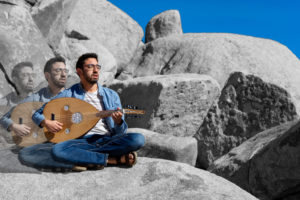Evelyn Frick | Hey Alma
For most of his life, musician Yoni Avi Battat has felt like an outsider in his own Iraqi-Jewish culture.

While his ancestors lived in Baghdad for centuries, spoke Iraqi Judeo-Arabic (and eventually the Iraqi dialect of Arabic), and were fully immersed in one of the oldest Jewish communities in the world, Yoni’s connections to his heritage were more tenuous.
Around 1951, Yoni’s paternal grandparents Violet and Avraham left their homeland for Israel, seeking safety during a time of intense persecution of Jews in Iraq. Via Jerusalem, they finally settled in the United States, where Yoni was born and raised years later.
To be sure, his life in the U.S. has been a successful one. At 4 years old, Yoni started playing violin; now he’s a multi-instrumentalist, vocalist, and composer with degrees from Brandeis University and Boston University. He’s the core violinist of mixed chamber group VSNY; he’s performed with the Israel Klezmer Orchestra; developed his own Yiddish jazz band, Two Shekel Swing; and studied with Simon Shaheen, an oud player, violinist, and pedagogue of Arabic music. He was also a member of the touring cast of the Broadway musical “The Band’s Visit.”
Even so, in Ashkenormative Jewish American culture, with English as his mother tongue and never having stepped foot in Iraq to this day, Yoni lacks the kinds of heirlooms and ancestral knowledge that American immigrant families often have.
So Yoni decided to make his own.
Released this month on the music streaming platform Bandcamp, Yoni’s first album, “Fragments,” explores his fragmented Arab-Jewish identity.
The album features lyrics in Arabic, Hebrew, English, and even a little Yiddish. They are derived from ancient and contemporary poetic sources, Hebrew liturgy, his own writing, and the writing of his family. Yoni employs maqam, the modal system found in Arabic music, and the resulting work is an exquisite and necessary addition to the canon of Jewish music.
Songs like “Vapor,” Yoni’s current favorite, unravel the barrier between Jewish languages while capturing, in his words, an “almost stream of consciousness unraveling of melody.” At the same time, there are also more traditional pieces, like an interpretation of Iraqi piyyut “El Eliyahu,” that brings together the voices of Yoni and Razi Battat, Yoni’s uncle and a beloved pillar of his Iraqi Jewish ancestry. Though each song could stand by itself, in total, “Fragments” is both a remembrance of bygone Mizrahi generations and a celebration of Yoni’s journey to understand himself.
“As you experience these original and traditional pieces, I invite you to approach memory in a new way — not through exact facts, dates, and photos, but through your senses, through your imagination,” Yoni writes in the liner notes. “Allow these smells, textures, tastes, and sounds to transport you to a place and time you have never been. When we cannot access the specific details of our families’ stories, our imagination can still bring us a real and intimate connection with where we come from.”
This article has been edited for length. For the full interview and other stories like this, visit heyalma.com.
Evelyn Frick is Hey Alma’s editorial assistant.







